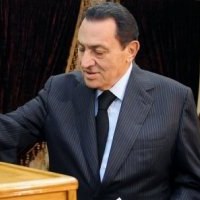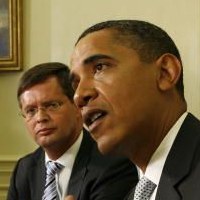![]()
Sun, March 20, 2011 | Guardian
WikiLeaks: President Karzai’s half-brother is ‘kingpin of Kandahar’
As we step up engagement with GIRoA leadership in Kandahar, it is important to understand the dynamics of political power and how fundamental Kandahar is to the fortunes of the Karzai regime. It is from Kandahar that President Karzai’s claim to national legitimacy originates and from the province that the Karzai family’s position as a semi-modern aristocracy stems. As the kingpin of Kandahar, the President’s younger half-brother Ahmed Wali Karzai (AWK) dominates access to economic resources, patronage, and protection. Much of the real business of running Kandahar takes place out of public sight, where AWK operates, parallel to formal government structures, through a network of political clans that use state institutions to protect and enable licit and illicit enterprises. A dramatic example is the Arghandab river valley, an agriculturally rich and heavily-populated district strategically located at the northern gate to Kandahar City, where the President’s direct intervention in the Alikozai tribal succession increased Karzai political dominance over two of the most valuable resources in Kandahar — fertile land and water. The tribal power structure in Kandahar seriously complicates our efforts to bring formal justice and modern governance to the region. In the absence of GIRoA initiatives to bring key individuals closely linked to the Karzai regime to justice, RC South is pursuing a bottom-up approach to the Arghandab shura.
Source: WikiLeaks
Sunday, 06 December 2009, 09:53
C O N F I D E N T I A L SECTION 01 OF 03 KABUL 003890
SIPDIS
STATE FOR SRAP HOLBROOKE, SCA/FO, SCA/A
STATE PASS USAID ASIA/SCAA
USFOR-A FOR POLADEO 12958 DECL: 11/30/2019
TAGS KDEM, PGOV, PTER, AF
SUBJECT: KANDAHAR POLITICS COMPLICATE U.S. OBJECTIVES IN
AFGHANISTAN
REF: A. KABUL 3748 B. KABUL 3595Classified By: Coordinator Director for Development and Economic Affair s E. Anthony Wayne, reasons 1.4 (b) and (d)
1. (C) Summary: As we step up engagement with GIRoA leadership in Kandahar, it is important to understand the dynamics of political power and how fundamental Kandahar is to the fortunes of the Karzai regime. It is from Kandahar that President Karzai’s claim to national legitimacy originates and from the province that the Karzai family’s position as a semi-modern aristocracy stems. As the kingpin of Kandahar, the President’s younger half-brother Ahmed Wali Karzai (AWK) dominates access to economic resources, patronage, and protection. Much of the real business of running Kandahar takes place out of public sight, where AWK operates, parallel to formal government structures, through a network of political clans that use state institutions to protect and enable licit and illicit enterprises. A dramatic example is the Arghandab river valley, an agriculturally rich and heavily-populated district strategically located at the northern gate to Kandahar City, where the President’s direct intervention in the Alikozai tribal succession increased Karzai political dominance over two of the most valuable resources in Kandahar — fertile land and water. The tribal power structure in Kandahar seriously complicates our efforts to bring formal justice and modern governance to the region. In the absence of GIRoA initiatives to bring key individuals closely linked to the Karzai regime to justice, RC South is pursuing a bottom-up approach to the Arghandab shura. End Summary.
2. (C) As we step up engagement with GIRoA leadership in Kandahar in pursuit of U.S. security, stabilization, development and anti-corruption goals, it is important to understand the dynamics of political power and how fundamental Kandahar is to the fortunes of the Karzai regime (Ref A). It is from Kandahar, not Kabul, that President Karzai’s claim to national legitimacy originates, and where, through leadership of the royal Durrani Popalzai tribe, he has a true political base. In Kandahar, political clans consisting of personal, tribal, marriage and economic alliances engage in balance of power competition and cooperation. At the pinnacle of Kandahar’s political clans, the Karzai clan functions as a semi-modern aristocracy, with the President ultimately presiding over the nation.
3. (C) As the kingpin of Kandahar, the President’s younger half-brother, Ahmed Wali Karzai, rules over political deal and decision-making at the provincial level and thereby dominates access to economic resources, patronage and protection. The overriding purpose that unifies his political roles as Chairman of the Kandahar Provincial Council and as the President’s personal representative to the South is the enrichment, extension and perpetuation of the Karzai clan, and along with it their branch of the Popalzai tribe. This applies equally to his entrepreneurial and his alleged criminal activities. AWK derives authority and legitimacy from his relationship to President Karzai, from the relative discipline and elite position of the Popalzai tribe and from his access to resources. In Kandahar’s political realm, he is an unrivaled strongman. For example, the Kandahar Provincial Council, which is made up largely of individuals who are personally beholden to him, wields serious influence, despite its lack of statutory powers. It is currently going about its business unhindered despite the fraud charges that have prevented the IEC from certifying the recent Provincial Council election results (Ref B). Preceded by the removal of three successive provincial governors who challenged Karzai dominance, Tooryalai Wesa, a political novice, family friend and former agriculture professor, has proven adequately compliant.
4. (C) Much of the real business of running Kandahar takes place out of public sight, where AWK operates parallel to formal government structures through a network of political clans that use state institutions to protect and enable licit and illicit enterprises. At its core, this clan network has a caste-like division of labor. The Popalzai occupy the leadership pinnacle. The Barakzai, with Gul Agha Sherzai as their leader, compete for power and business, which includes, for example, contracting at Kandahar Air Field and transport on Highway 4 from the Pakistan border at Spin Boldak. The Noorzai occupy key positions in the ANSF and are the traditional racketeers (with ties to narcotics trafficking). The Achekzais along the border are the traditional smugglers, and the Alikozai are the traditional
KABUL 00003890 002 OF 003
warriors.
5. (C) Among Karzai family-run businesses are alleged control of trucking on Highway 1 (the Ring Road) through Kandahar Province and beyond, private security contracting and real estate. The last notably includes Ayno Mina, an ostentatious Karzai property development for Afghan elites east of Kandahar City, built on land obtained from the government at rock bottom prices, with financing guaranteed by OPIC. In a land of popular strongmen, AWK is widely unpopular in Kandahar, because he rules exclusively rather than inclusively; he is not perceived as caring about the population at large but rather, as a traditional Pashtuns Khan using his power to “feed his tribe.”
6. (C) A good example of how the Karzais’ power plays out in Kandahar can be found in the Arghandab river valley, an agriculturally rich and heavily populated district strategically located at the northern gate to Kandahar City, where the Alikozai tribe makes up 60 percent of the population. They received the valley as a reward for assisting the founder of Afghanistan, Ahmed Shah Durrani, conquer Kandahar in the mid-1700s. As the guardians of Kandahar, the Alikozais have prevented all invaders from occupying Arghandab. The Soviets fought hard but never took it and as a result were never secure in Kandahar City. The Taliban’s rise to power began in Kandahar, when the powerful Alikozai leader Mullah Naquibullah decided to give them the keys to the city, and he turned on them to assist their overthrow in 2001. When Mullah Naqib died of a heart attack in 2007, President Karzai took the unusual step of flying to Kandahar, where he anointed Naquib’s son Karimullah as the new leader of the Alikozai. However, the move had significant blowback. Mullah Naqib had never designated his young and inexperienced son as his successor, and Karzai’s intervention generated resentment among senior Alikozai elders. The resulting split weakened tribal unity, a vulnerability the Taliban quickly exploited, and it remains a present source of instability.
7. (C) The Arghandab story appears on the surface to be a case of bungled tribal exploitation. On the contrary, by intervening in the Alikozai succession, the Karzais linked the most important tribal faction to control over the provincial government in a line that runs from AWK to their putative leader Karimullah, who in turn holds sway over the District Administrator and local shura. The Karzais also increased their influence over two of the most valuable resources in Kandahar (which is largely desert) — fertile land and water. The Arghandab river valley, contains some of the best agricultural land in Afghanistan; it famously produces 80 percent of the country’s pomegranates. Production and land values there will increase greatly as a result of Canada’s “signature” rehabilitation of the Dahla Dam and irrigation works, originally constructed by the U.S. in the 1950s. Karzai businesses are also set to acquire multiple patronage benefits from Dahla Dam construction and security contracts, but the main prize will be political control over long-term allocation of water flows, including to Popalzai and Barakzai areas that lie well downstream, via underground canals to the south.
8. (C) It is no accident that AWK lobbied the project’s Canadian sponsors on behalf of the Watan Group, the eventual winner of the Dahla Dam security contract, whose CEO is his cousin, U.S. national Rashid Popal. More than business is involved; most of the project lies in Alikozai majority areas, but the Popalzai will control security, and Alikozai leader Karimullah was incensed over this treatment by his Karzai sponsors when he found out. A follow-on to warlord militias, private security companies today also serve personal interests as camouflaged vehicles for protection rackets in construction, transportation and drug smuggling. AWK’s determined but so far unsuccessful efforts to acquire MOI-sanction to license all contractors and their weapons through the Provincial Council has the potential to arm the Karzai clan with a non-state entity that can insure against whoever should come to power in Afghanistan.
9. (C) Comment: The traditional tribal power structures in Kandahar have many implications for U.S. objectives in the region. Initiatives that rely on GIRoA to take the lead in bringing to justice major corrupt figures or negative influences in Kandahar contain a serious dilemma: they would include some of Karzai,s closest relatives and allies and require the prosecution of people on whom we often rely for assistance and/or support. Second, any efforts to bring these individuals to justice could compromise the informal
KABUL 00003890 003 OF 003
governing networks to which Kandaharis have become accustomed, without necessarily replacing them with effective GIRoA officials or improving the delivery of services. A focus on bottom-up local solutions, such as identifying and reaching out to the multiple factions in Arghandab as well as the official shura, which RC South is pursuing, could offset this problem to some degree. End Comment.
10. (U) This assessment, derived from multiple sources including information provided by over a dozen knowledgeable Afghans, presents a perspective that is widely perceived among the Afghan public and consistent with documentation in open sources and intelligence analyses.
MUSSOMELI



 RSS
RSS











#WikiLeaks: President Karzai’s half-brother is ‘kingpin of Kandahar’ | #Afghanistan #Cablegate http://j.mp/gjeTf3
RT @CrethiPlethi: #WikiLeaks: President Karzai’s half-brother is ‘kingpin of Kandahar’ | #Afghanistan #Cablegate http://j.mp/gjeTf3